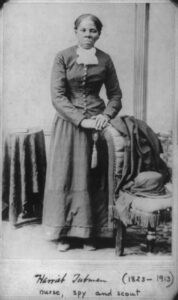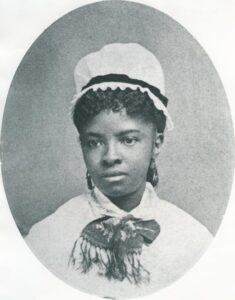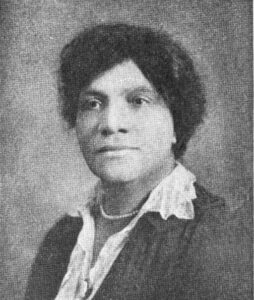Honoring the Legacy of 10 Trailblazing Black Nurses
Every February, we observe Black History Month—a dedicated time to honor and spotlight the contributions of African Americans throughout U.S. history. Within American healthcare, Black nurses have played a crucial role in shaping the profession and helping dismantle systemic barriers.
In this article, we explore the extraordinary achievements and impact of 10 remarkable Black nurses, each contributing significantly to U.S healthcare. These pioneers overcame challenges to make a lasting impact on nursing and set the groundwork for future Black nurses.
Trailblazing Black Nurses
Harriet Tubman

Harriet Tubman, widely celebrated for her pivotal role as a conductor on the Underground Railroad, made remarkable contributions to healthcare during the Civil War. As a nurse and a caregiver, Tubman provided essential medical support to Union soldiers and civilians. Her courage and resourcefulness extended beyond guiding enslaved people to freedom, as she actively participated in treating illnesses and injuries and promoting general well-being. Tubman’s legacy is a testament to her multifaceted contributions, from humanitarian efforts to advancing healthcare access for those in need.
Image attribution: “Harriet Tubman National Historical Park” by National Park Service is licensed under CC BY 2.0.
Mary Eliza Mahoney

Recognized as the first Black professional nurse in the United States, Mary Eliza Mahoney dedicated her life to breaking racial barriers in healthcare. Overcoming systemic challenges, Mahoney graduated in 1879 from the New England Hospital for Women and Children Training School for Nurses. She advocated for racial equality in nursing throughout her career and co-founded the National Association of Colored Graduate Nurses (NACGN). Mahoney’s pioneering spirit paved the way for future generations of Black nurses, emphasizing the importance of diversity in the healthcare workforce.
Adah Belle Thoms

Adah Belle Thoms emerged as a trailblazer in public health nursing, focusing on maternal and child health. Committed to improving community well-being, Thoms worked tirelessly to address health disparities among underserved populations. She advocated for accessible healthcare services and promoted public health initiatives. Thoms’s contributions have left an indelible mark on the field, influencing policies and practices that continue to resonate in public health and nursing.
Mabel Keaton Staupers
Mabel Keaton Staupers, a pioneering nurse leader, dedicated her career to advancing racial integration in nursing. While serving as the executive secretary of the National Association of Colored Graduate Nurses (NACGN) and later merging it with the American Nurses Association (ANA), Staupers championed equality and challenged discriminatory practices in nursing education and employment. Her advocacy and leadership significantly contributed to breaking down racial barriers, helping to foster a more inclusive environment within the nursing community.
Estelle Massey Osborne
Estelle Massey Osborne made history as the first Black woman to earn a master’s degree in nursing. A dedicated educator, Osborne promoted excellence in nursing education and tirelessly advocated for racial equality in healthcare. Her groundbreaking achievements laid the foundation for increased diversity within nursing academia, inspiring future generations of Black healthcare professionals to pursue excellence in their careers.
Mary Elizabeth Carnegie
As a distinguished nursing scholar and advocate, Mary Elizabeth Carnegie helped promote diversity and inclusion in nursing education. Carnegie’s work focused on challenging discriminatory practices and fostering an environment that welcomed individuals from diverse backgrounds. Her contributions to nursing scholarship and leadership significantly influenced nursing education and actively championed for fairness within the healthcare system, leaving a lasting impact on the field.
Catherine Alicia Georges
Catherine Alicia Georges, a distinguished nurse and leader, has significantly contributed to healthcare, education, and advocacy. As a trailblazer in nursing, she has dedicated her career to addressing healthcare disparities and promoting health equity.
Georges has been a fervent advocate for the rights of older adults, particularly focused on improving the quality of care for older populations. Serving as the President of the AARP (American Association of Retired Persons), she has been at the forefront of initiatives to enhance the well-being of older individuals, advocating for policies that prioritize their health and dignity.
Georges’s work continues to inspire and shape the landscape of nursing, emphasizing the importance of compassionate and inclusive healthcare for all.
Darlene Clark Hine
Darlene Clark Hine is a prominent historian, scholar, and advocate who has extensively researched and documented the history of Black nurses. Her work delves into the experiences of Black healthcare professionals, providing valuable insights into the challenges they faced and the triumphs they achieved.
Hine’s commitment to preserving and sharing the stories of Black nurses has contributed significantly to a more comprehensive understanding of the historical context of Black nursing in the United States. As a distinguished academic, she has written extensively on African American history, women’s history, and the intersection of race and gender in healthcare. Hine’s scholarship continues to be a beacon, shedding light on the resilience and contributions of Black nurses throughout history.
The Black Angels
The Black Angels were a remarkable group of nurses, largely unrecognized for their work until recently. The Black Angels provided dedicated care to over 2000 tuberculosis patients at Seaview Hospital in Staten Island in the 1940s. They also played a pivotal role in the science and research for finding a cure for tuberculosis.
These nurses displayed exceptional medical proficiency and confronted racial disparities to deliver essential care. The Black Angels’ commitment to their patients exceeded the call of duty, a testament to their resilience and dedication to public health.
For more information on their work, visit For Nurses By Nurses, a production company that produced the documentary “The Black Angels: A Nurse’s Story” by Danetra Hampton.
Tuskegee Army Nurses
Approximately 28 Black nurses were part of the Tuskegee Army Nurses. They played a vital role in World War II serving at Tuskegee Army Airfield. During the war, these nurses overcame racial and gender discrimination to provide essential healthcare services. To gain a deeper understanding of their experiences and their significant contributions to wartime healthcare, visit Tuskegee Army Nurses.
This website offers a library of historical documents and personal narratives of the experiences of the Tuskegee Army Nurses. The stories highlight the resilience and dedication of these Black nurses during a critical period in global history.
Honoring Their Legacy
While we celebrate the achievements of these trailblazing Black nurses, it’s essential to acknowledge the countless others who have made significant contributions to healthcare. Many of their names were lost in history and have never received the widespread recognition they deserve. The fight for equity and inclusion in nursing and healthcare continues. By recognizing and learning from these healthcare pioneers, we honor their legacy and their work toward a more inclusive future.
For more information, resources, and support for Black nurses, check out organizations such as the National Black Nurses Association (NBNA), Minority Nurse, and Black Nurses Rock.






